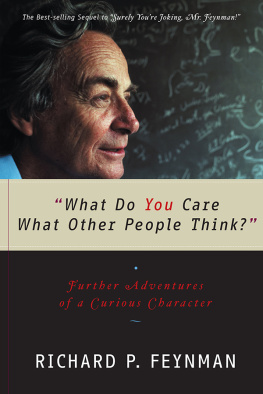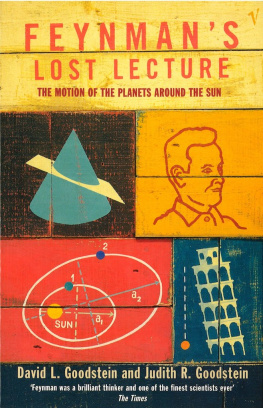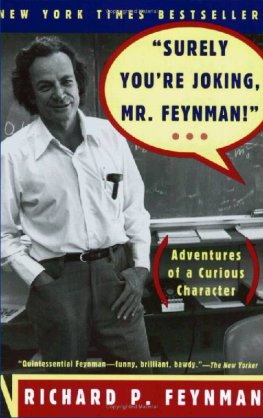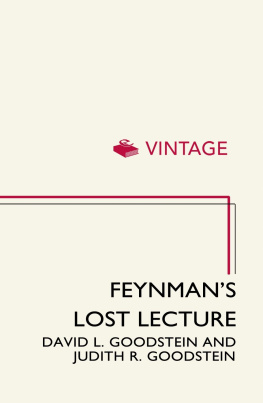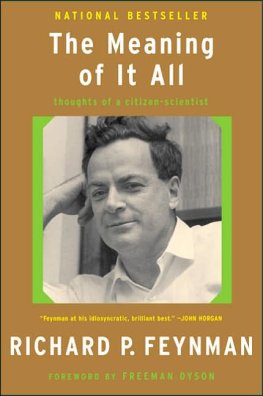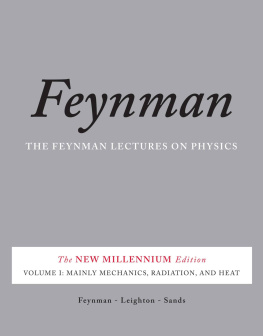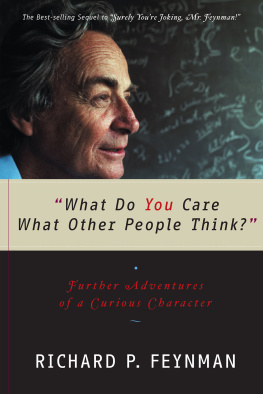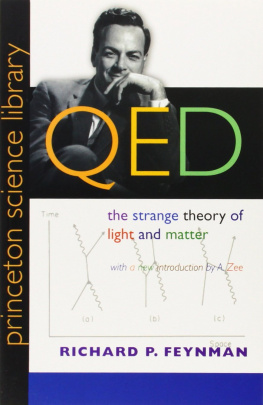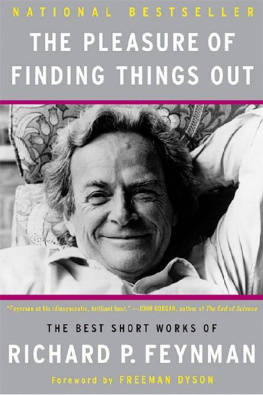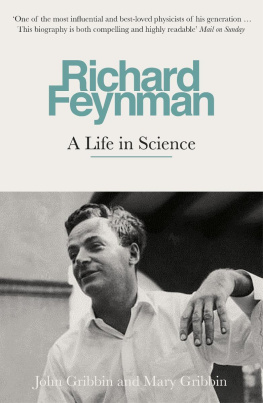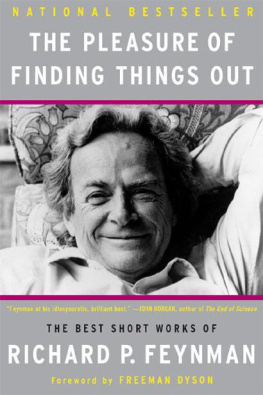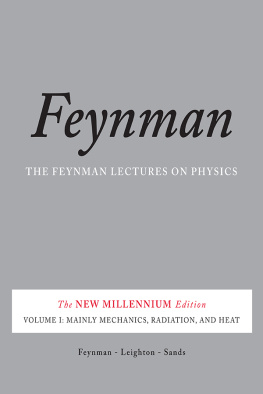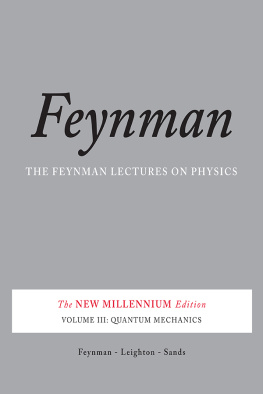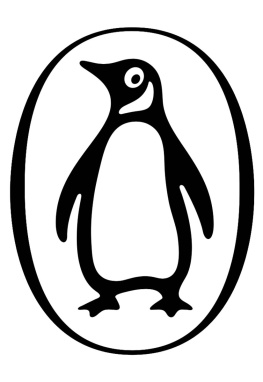What Do You Care What Other People Think?
Further Adventures of a Curious Character
Richard P. Feynman
as told to Ralph Leighton

Copyright 1988 by Gweneth Feynman and Ralph Leighton
All rights reserved
First published as a Norton paperback 2001
For information about permission to reproduce selections from this book,
write to Permissions, W. W. Norton & Company, Inc.,
500 Fifth Avenue, New York, NY 10110
For information about special discounts for bulk purchases, please contact
W. W. Norton Special Sales at specialsales@wwnorton.com or 800-233-4830
Book design by Chris Welch
Production manager: Andrea Grant
Library of Congress Cataloging-in-Publication Data
Feynman, Richard Phillips.
"What do you care what other people think?" : further adventures of
a curious character/by Richard P. Feynman, as told to Ralph
Leighton
p. cm.
Includes index.
1. Feynman, Richard Phillips. 2. PhysicistsUnited States
Biography. 3. ScienceAnecdotes. I. Leighton, Ralph.
II. Title.
QC16.F49A3 1988
530'.9'2'dc19
[B]
ISBN 978-0-393-32092-3 pbk.
ISBN 978-0-393-07981-4 (e-book)
W. W. Norton & Company, Inc.
500 Fifth Avenue, New York, N.Y. 10110
www.wwnorton.com
W. W. Norton & Company Ltd.
Castle House, 75/76 Wells Street, London W1T 3QT
Contents
Preface
BECAUSE of the appearance of Surely Youre Joking, Mr. Feynman! a few things need to be explained here.
First, although the central character in this book is the same as before, the adventures of a curious character here are different: some are light and some tragic, but most of the time Mr. Feynman is surely not jokingalthough its often hard to tell.
Second, the stories in this book fit together more loosely than those in Surely Youre Joking , where they were arranged chronologically to give a semblance of order. (That resulted in some readers getting the mistaken idea that SYJ is an autobiography.) My motivation is simple: ever since hearing my first Feynman stories, I have had the powerful desire to share them with others.
Finally, most of these stories were not told at drumming sessions, as before. I will elaborate on this in the brief outline that follows.
Part 1, A Curious Character, begins by describing the influence of those who most shaped Feynmans personalityhis father, Mel, and his first love, Arlene. The first story was adapted from The Pleasure of Finding Things Out, a BBC program produced by Christopher Sykes. The story of Arlene, from which the title of this book was taken, was painful for Feynman to recount. It was assembled over the past ten years out of pieces from six different stories. When it was finally complete, Feynman was especially fond of this story, and happy to share it with others.
The other Feynman stories in Part 1, although generally lighter in tone, are included here because there wont be a second volume of SYJ . Feynman was particularly proud of Its as Simple as One, Two, Three, which he occasionally thought of writing up as a psychology paper. The letters in the last chapter of Part 1 have been provided courtesy of Gweneth Feynman, Freeman Dyson, and Henry Bethe.
Part 2, Mr. Feynman Goes to Washington, is, unfortunately, Feynmans last big adventure. The story is particularly long because its content is still timely. (Shorter versions have appeared in Engineering and Science and Physics Today .) It was not published sooner because Feynman underwent his third and fourth major surgeriesplus radiation, hyperthermia, and other treatmentssince serving on the Rogers Commission.
Feynmans decade-long battle against cancer ended on February 15, 1988, two weeks after he taught his last class at Caltech. I decided to include one of his most eloquent and inspirational speeches, The Value of Science, as an epilogue.
Ralph Leighton
March 1988
What Do You Care What Other People Think?
Part 1
A CURIOUS CHARACTER
The Making of a Scientist
I HAVE a friend whos an artist, and he sometimes takes a view which I dont agree with. Hell hold up a flower and say, Look how beautiful it is, and Ill agree. But then hell say, I, as an artist, can see how beautiful a flower is. But you, as a scientist, take it all apart and it becomes dull. I think hes kind of nutty.
First of all, the beauty that he sees is available to other peopleand to me, too, I believe. Although I might not be quite as refined aesthetically as he is, I can appreciate the beauty of a flower. But at the same time, I see much more in the flower than he sees. I can imagine the cells inside, which also have a beauty. Theres beauty not just at the dimension of one centimeter; theres also beauty at a smaller dimension.
There are the complicated actions of the cells, and other processes. The fact that the colors in the flower have evolved in order to attract insects to pollinate it is interesting; that means insects can see the colors. That adds a question: does this aesthetic sense we have also exist in lower forms of life? There are all kinds of interesting questions that come from a knowledge of science, which only adds to the excitement and mystery and awe of a flower. It only adds. I dont understand how it subtracts.
Ive always been very one-sided about science, and when I was younger I concentrated almost all my effort on it. In those days I didnt have time, and I didnt have much patience, to learn whats called the humanities. Even though there were humanities courses in the university that you had to take in order to graduate, I tried my best to avoid them. Its only afterwards, when Ive gotten older and more relaxed, that Ive spread out a little bit. Ive learned to draw and I read a little bit, but Im really still a very one-sided person and I dont know a great deal. I have a limited intelligence and I use it in a particular direction.
Before I was born, my father told my mother, If its a boy, hes going to be a scientist. When I was just a little kid, very small in a highchair, my father brought home a lot of little bathroom tilessecondsof different colors. We played with them, my father setting them up vertically on my highchair like dominoes, and I would push one end so they would all go down.
Then after a while, Id help set them up. Pretty soon, were setting them up in a more complicated way: two white tiles and a blue tile, two white tiles and a blue tile, and so on. When my mother saw that she said, Leave the poor child alone. If he wants to put a blue tile, let him put a blue tile.
But my father said, No, I want to show him what patterns are like and how interesting they are. Its a kind of elementary mathematics. So he started very early to tell me about the world and how interesting it is.
We had the Encyclopaedia Britannica at home. When I was a small boy he used to sit me on his lap and read to me from the Britannica . We would be reading, say, about dinosaurs. It would be talking about the Tyrannosaurus rex , and it would say something like, This dinosaur is twenty-five feet high and its head is six feet across.
My father would stop reading and say, Now, lets see what that means. That would mean that if he stood in our front yard, he would be tall enough to put his head through our window up here. (We were on the second floor.) But his head would be too wide to fit in the window. Everything he read to me he would translate as best he could into some reality.
It was very exciting and very, very interesting to think there were animals of such magnitudeand that they all died out, and that nobody knew why. I wasnt frightened that there would be one coming in my window as a consequence of this. But I learned from my father to translate: everything I read I try to figure out what it really means, what its really saying.

